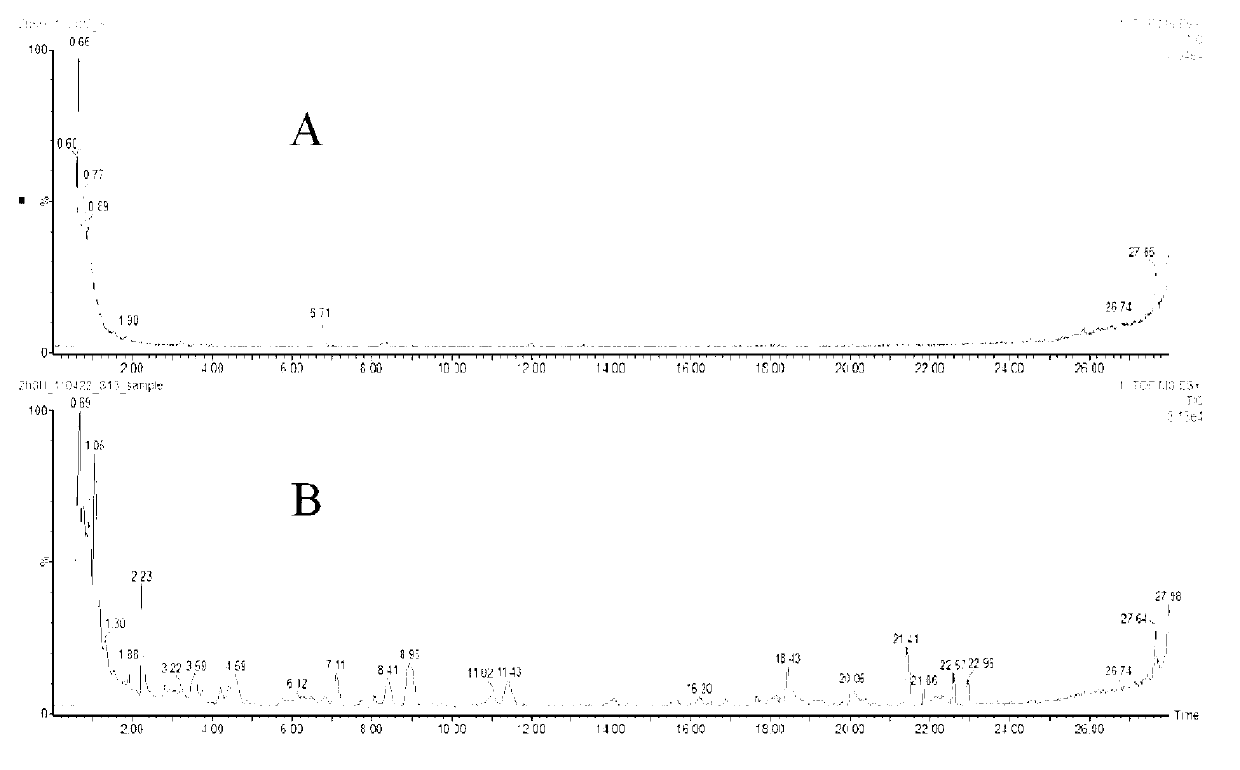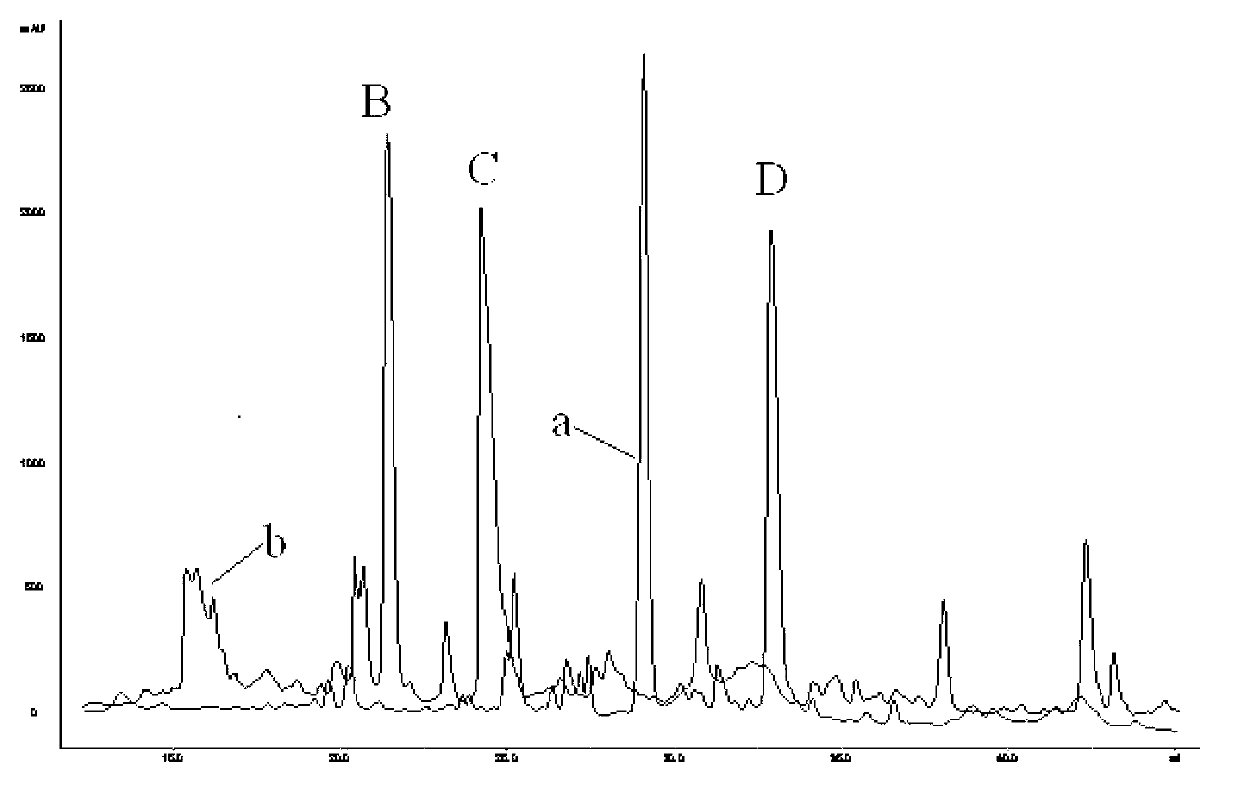Bioactive polypeptide QEPVL, and preparation and application thereof
A technology of biologically active peptides and derivatives, applied in the field of protein, can solve problems such as human body risks, achieve the effects of improving immunity, enhancing proliferation ability, and reducing damage
- Summary
- Abstract
- Description
- Claims
- Application Information
AI Technical Summary
Problems solved by technology
Method used
Image
Examples
Embodiment 1
[0056] The preparation of embodiment 1 active peptide QEPVL
[0057] 1. Preparation of fermented milk
[0058] 1) Lactobacillus helveticus fermented milk
[0059] Use skimmed milk powder (New Zealand NZMP brand skimmed milk powder) and water to prepare 12wt% skimmed milk (12g skimmed milk powder is added to 88g water, the same below). Under aseptic conditions, the tricyclic colony of Lactobacillus helveticus (CICC6024) was picked, added into sterilized 12wt% skim milk, and stirred evenly under aseptic conditions. After inoculation, seal with aluminum foil to prevent contamination. Place in an incubator at 37°C for 19 hours. After the cultivation is over, the curd is stirred evenly under aseptic conditions to complete the activation of the Lactobacillus helveticus and prepare the starter for preparing the Lactobacillus helveticus fermented milk.
[0060] Inoculate 10mL of the prepared Lactobacillus helveticus starter into 500mL of sterilized 12wt% skim milk (inoculation rat...
Embodiment 2
[0131] Preparation and Confirmation of Example 2 Bioactive Peptide QEPV
[0132] 1. Enzymatic hydrolysis of bioactive peptide QEPVL by simulating gastrointestinal digestion in vitro
[0133] The simulated gastrointestinal digestion experiment is mainly divided into two steps. First, use sterilized deionized water to prepare a bioactive peptide QEPVL solution with a concentration of 500 μg / mL, and add pepsin (purchased from Sigma Company) to the QEPVL solution with a concentration of 500 μg / mL at a ratio of 20 mg of pepsin per gram of QEPVL. The pH value of the reaction solution was brought to 2.0, and incubated in a constant temperature water bath at 37°C for 90 minutes; then the pH value of the reaction solution was adjusted to 7.5, and trypsin (Corolase PP, purchased from AB Company in Germany) was added at the ratio of adding trypsin per gram of QEPVL 40 mg, kept in a constant temperature water bath at 37°C for 150 minutes; finally placed in a water bath at 95°C for 5 minu...
Embodiment 3
[0148] Antioxidant activity experiment of embodiment 3 bioactive polypeptide QEPVL and QEPV
[0149] The antioxidant activity of the biologically active polypeptide QEPVL obtained in Example 1 was tested by free radical scavenging method (DPPH·method) and total antioxidant capacity method (Ferric ReducingAbility Power FRAP method).
[0150] 1. Determination of in vitro antioxidant activity of bioactive peptide QEPVL by [DPPH·] method
[0151] 1) Experimental reagents and instruments
[0152] Reagent: 1,1-diphenyl-2-trinitrophenylhydrazine (1,1-Diphenyl-2-picrylhydrazyl[DPPH·]), produced by Wako Company of Japan; Methanol, provided by Shanghai Sinopharm Company; obtained in Example 1 The milk-derived biologically active polypeptide QEPVL (collected peak D sample) obtained from the fermentation of Lactobacillus helveticus and the milk-derived biologically active polypeptide QEPV obtained in Example 2.
[0153] Main instruments: Sunrise microplate reader, product of Tecan Compa...
PUM
| Property | Measurement | Unit |
|---|---|---|
| molecular weight | aaaaa | aaaaa |
| collision energy | aaaaa | aaaaa |
| correlation coefficient | aaaaa | aaaaa |
Abstract
Description
Claims
Application Information
 Login to View More
Login to View More - R&D
- Intellectual Property
- Life Sciences
- Materials
- Tech Scout
- Unparalleled Data Quality
- Higher Quality Content
- 60% Fewer Hallucinations
Browse by: Latest US Patents, China's latest patents, Technical Efficacy Thesaurus, Application Domain, Technology Topic, Popular Technical Reports.
© 2025 PatSnap. All rights reserved.Legal|Privacy policy|Modern Slavery Act Transparency Statement|Sitemap|About US| Contact US: help@patsnap.com



